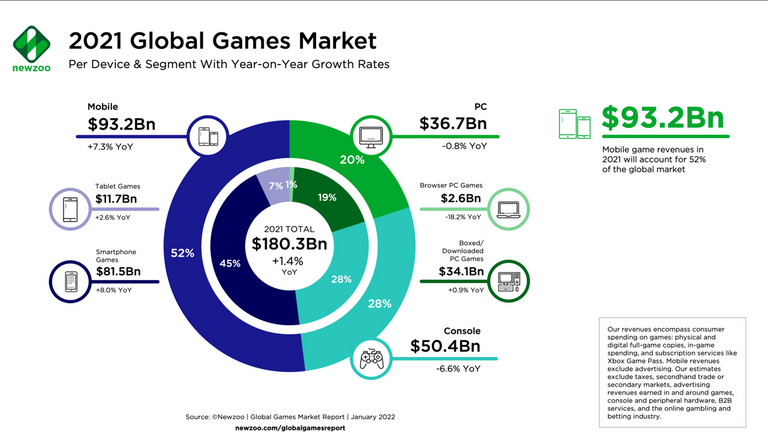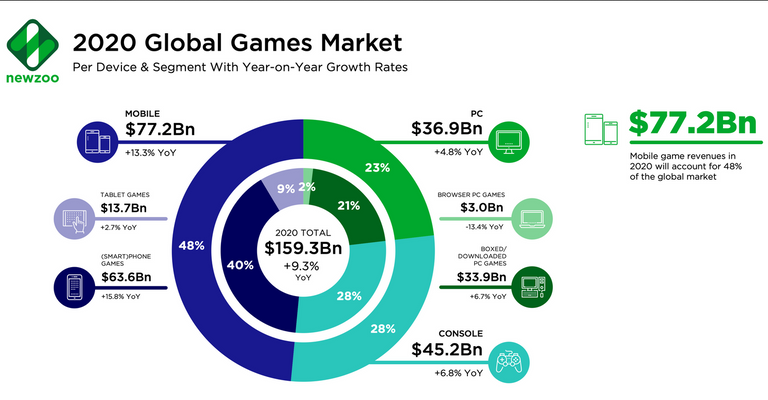
Los sectores dominantes del mercado, instalados cómodamente en sus respectivos medios, nunca imaginaron que, en los últimos años, la industria del videojuego alcanzaría la relevancia que hoy tiene.
Es un nuevo actor, en un cierto modo desconocido, el que dicta las reglas del juego, parafraseando el término.
Celulares, ordenadores de mesa, tabletas, las tradicionales cónsolas, nada escapa a la influencia del mismo. Muchos usuarios usan incluso para su propio perfil imágenes de los juegos que están de moda.
Este nuevo partícipe del mercado (llamémoslo "gaming" para sintetizar y generalizar el término) ha generado en sólo un par de décadas, una profunda revolución que va más allá del simple entretenimiento y termina con tener implicancias sociales, culturales y económicas, pero -fundamentalmente- creando un nuevo e interesante modelo de negocio que cambiando de acuerdo con los gustos de los usuarios en períodos cada vez más cortos.

A diferencia de la industria de otros medios como el cine, la radio y la TV, cuyo crecimiento ha sido mucho más lento y gradual, los videojuegos han alcanzado en pocos años (podemos simplificar diciendo que la verdadera "explosión" viene después del año 2000) una dimensión tal que los ha llevado a ser objeto de gran interés e inversión.
Los videojuegos cambian -de esta manera- su tradicional concepción lúdica como entretenimiento genérico, a una concepción de negocios como cualquier otra actividad productora de bienes y servicios que manufacturan y venden, es decir una empresa comercial como cualquier otra sujeta a las flucutuaciones del mercado y a sus reglas que usa básicamente Internet como instrumento para vehiculizar su expansión y distribución de los videojuegos poniendo las distintas plataformas de información, entretenimiento y comunicación instantáneamentede al servicio de los usuarios ("gamers").

También usando este fenomenal instrumento que es Internet y la conectividad que ofrece (a partir de este año con el 5G) surgen los dispositivos móviles, a los cuáles se incorporaran los videojuegos, primero más simples y ahora más sofisticados- apenas la conectividad lo va permitiendo, ampliando y acelerando sus oportunidades de crecimiento en el mercado internacional.
Esta expansión nos lleva a pensar cuál es el verdadero límite en esta nueva industria. La IA está presente en muchos de ellos y logra hacer interactuar al jugadores como si hiciera parte mismo del juego.
¿Existe realmente algún modelo de negocios aplicadicado a los videojuegos tan eficaz que perdure en el tiempo o en el futuro deberá estar sujeto a una continua actualización para tratar de seguir capturando la atención de un mercado de usuarios, ya en la actualidad, verdaderamente imponente?
Las grandes empresas de la industria del videjuego se han visto obligadas a adoptar una actitud sumamente dinámica para contrarrestar el efecto estático que las había distinguido en el pasado.
La industria de los videojuegos -por más que un sector tradicional de la sociedad trate de demostrar lo contario- es uno de los nuevos sectores económicos que tiene relación directa en el desarrollo, la distribución, el marketing, la venta de software y hardware en general, promoviendo nuevos modelos de computadoras, celulares y tabletas cada vez más potentes para poder disfrutar a plenitud de las nuevas posibilidades que el gaming ofrece.
No es solo el juego como concepto lúdico sino toda la industria electrónica que arrastra detrás de él, asociando de esta manera un modelo productivo que agrupa a diferentes disciplinas de trabajo y emplea a miles de personas en todo el mundo.
Pero el carácter extremadamente dinámico de esta industria hace que deba reinventarse y evolucionar en continuación, caso contrario su fin se decretaría en un futuro muy cercano, y para ello debe apoyarse principalmente en los avances tecnológicos, migrando de a poco pero en forma sostenida y consistente hacia el mundo digital.
Para dar una idea de la evolución de esta nueva industria es suficiente un dato: en estas últimas 2 décadas el gaming ha producido más dinero que lo que generaron el cine y la música -los dos juntos- en el mismo período.
El juego ha existido desde los mismos inicios de la fumanidad Podemos encontrar que desde la antigüedad, ya sea para divertir o entretener a las personas o para agregar actividades que servían para la ejercitación de diversas capacidades o destrezas, hasta pasar -con el correr de los años y los siglos- a hacer parte de las actividades económicas, desde el mismo momento en que descubrieron que las personas creían justo pagar por entretenerse.
Esto llevó a que numerosos intelectuales en el campo de la filosofía, la antropología, la sociología, la psicología, la historia -es suficiente ver los numerosos juegos de estrategia- y la pedagogia entras disciplinas exprimieran su opinión sus propias teorías interpretativas sobre el mismogaming y, especialmente, sobre sus potencialidades, alertando también obviamente sobre los riesgos que el uso y abuso de esta actividad podía llevar a los usuarios.
Sin embargo, a pesar de las numerosas críticas en el pasado, la industria del videjuego asumiendo un perfil bajo, más bien tímida, y sin una apariencia cierta de produndizar en el aspecto intelectual más allá de su concepción tradicional lúdica, fue abriándose paso en un mercado tremendamente competitivo al punto de llegar a revolucionar y preocupar a muchos de los grandes participantes del mercado de medios instalados cómodamente y sin preocupaciones durante muchas décadas, a la sombra de los beneficios obtenidos.
La regla de oro en la industria de los videojuegos es reinventarse en continuación.

Muchos de estos actores han tenido que cambiar actitud, reinventarse, cambiar la estrategia de desarrollo y programación. Los juegos para cónsolas son un ejemplo con dos multinacionales del calibre de Sony (Play Station) y Microsoft (xBox). Ya no es suficiente contar con un número de jugadores para FIFA en el aspecto deportivo o que sigan las aventuras de Assasin Creed por citar dos ejemplos al azar, aunque bastante conocidos a nivel mundial.
Este nuevo modelo en la industria de los videojuegos los ha obligado a una constante actualización para complementarse incluso y acompañar a este nuevo actor, provocando -a su vez- una profunda revolución con implicancias sociales, culturales y económicas, y creando a la vez nuevos e interesantes modelos de negocios los cuales van cambiando en períodos cada vez más cortos, causando un efecto dinámico de notable energadura e importancia.
Estamos en presencia de un nuevo producto -nacido paradojalmente en el ámbito académico y militar- que se ha consolidado con raíces profundas en el consumo de masas reinventándose constantemente y ejerciendo un impacto de notables consecuencias no solo en las nuevas generaciones que veían los videojuegos con un novedoso medio audiovisual y que les permitiría protagonizar en adelante sus propias historias, sino también en otros sectores de la sociedad que han permitido definir nuevas generaciones de jugadores. Ya les había hablado de la Generación Z y los Millenials.
Desde los tiempos más remotos siempre hemos encontrado personas jugando y testimonio de ello son los numerosos restos arqueológicos, geroglíficos de la Edad Antigua especialmente en el Egipto de los faraones, vasijas, pinturas y escritos que constatan la importancia del juego en la humanidad, lo que hace prácticamente imposible determinar en qué momento exacto nació el juego
Estos juegos antiguos, en los albores mismos de la humanidad, rústicos y primigenios si se quiere, han ido evolucionando hasta encontrarse con la realidad actual donde vemos una verdadera industria del videojuego y sus relaciones con el mercado del vídeo y unido a un nuevo modelo de negocio de videojuegos e internet.


The dominant sectors of the market, comfortably ensconced in their respective media, never imagined that, in recent years, the video game industry would reach the relevance it has today.
A new, somewhat unknown player is dictating the rules of the game, to paraphrase the term.
Mobile phones, desktop computers, tablets, traditional consoles, nothing escapes its influence. Many users even use images of the games that are in fashion for their own profiles.
This new market participant (let's call it "gaming" to synthesise and generalise the term) has generated in just a couple of decades, a profound revolution that goes beyond simple entertainment and ends up having social, cultural and economic implications, but - fundamentally - creating a new and interesting business model that changes according to the tastes of users in ever shorter periods of time.
Unlike other media industries such as cinema, radio and TV, whose growth has been much slower and gradual, video games have reached in a few years (we can simplify by saying that the real "explosion" comes after the year 2000) such a dimension that they have become the object of great interest and investment.
In this way, video games have changed their traditional ludic conception as generic entertainment, to a business conception like any other activity producing goods and services that they manufacture and sell, that is, a commercial enterprise like any other subject to the fluctuations of the market and its rules, which basically uses the Internet as an instrument for the expansion and distribution of video games, placing the different information, entertainment and communication platforms instantaneously at the service of users ("gamers").
Also using this phenomenal instrument that is the Internet and the connectivity it offers (starting this year with 5G), mobile devices are emerging, which will incorporate video games, first simpler and now more sophisticated, as soon as connectivity allows, expanding and accelerating their opportunities for growth in the international market.
This expansion leads us to think about what is the real limit in this new industry. AI is present in many of them and manages to make players interact as if they were part of the game itself.
Is there really a business model applied to video games that is so effective that it will last over time, or will it have to be subject to continuous updating in the future to try to continue capturing the attention of an already impressive market of users?
The big players in the video game industry have been forced to adopt a highly dynamic attitude to counteract the static effect that had distinguished them in the past.
The video games industry - however much a traditional sector of society tries to prove otherwise - is one of the new economic sectors that is directly involved in the development, distribution, marketing, sale of software and hardware in general, promoting new models of computers, mobile phones and tablets that are increasingly more powerful in order to fully enjoy the new possibilities that gaming has to offer.
It is not only the game as a ludic concept but the entire electronics industry that drags behind it, thus associating a productive model that brings together different work disciplines and employs thousands of people all over the world.
But the extremely dynamic nature of this industry means that it must reinvent itself and continue to evolve, otherwise its demise will be decreed in the very near future, and for this it must rely mainly on technological advances, migrating slowly but steadily and consistently towards the digital world.
To give an idea of the evolution of this new industry, just one fact is enough: in the last two decades, gaming has produced more money than film and music - the two together - did in the same period.
Gaming has existed since the very beginnings of smoking. We can find that since ancient times, either to amuse or entertain people or to add activities that served to exercise various capacities or skills, until - over the years and centuries - it became part of economic activities, from the very moment it was discovered that people thought it was fair to pay for entertainment.
This led numerous intellectuals in the fields of philosophy, anthropology, sociology, psychology, history - just look at the numerous strategy games - and pedagogy among other disciplines to express their own interpretative theories on mismogaming and, especially, on its potentialities, obviously also warning about the risks that the use and abuse of this activity could bring to the users.
However, despite the numerous criticisms in the past, the video game industry, assuming a low profile, rather timid, and without a certain appearance of going deeper into the intellectual aspect beyond its traditional playful conception, was making its way in a tremendously competitive market to the point of revolutionising and worrying many of the big players in the media market, comfortably and carefree for many decades, in the shadow of the profits obtained.

The golden rule in the video game industry is to keep reinventing yourself.
Many of these players have had to change their attitude, reinvent themselves, change their development and programming strategy. Console games are a case in point with two multinationals of the calibre of Sony (Play Station) and Microsoft (xBox). It is no longer enough to have a number of players for FIFA on the sports side or to follow the adventures of Assasin Creed to cite two random, but quite well-known examples worldwide.
This new model in the video game industry has forced them to constantly update themselves to complement and even accompany this new player, provoking - in turn - a profound revolution with social, cultural and economic implications, and at the same time creating new and interesting business models which are changing in shorter and shorter periods of time, causing a dynamic effect of remarkable energy and importance.
We are in the presence of a new product - born paradoxically in the academic and military sphere - that has established itself with deep roots in mass consumption, constantly reinventing itself and exerting an impact of remarkable consequences not only on the new generations who saw video games as a new audiovisual medium that would allow them to star in their own stories, but also on other sectors of society that have defined new generations of gamers. I had already talked about Generation Z and Millenials .
From the earliest times we have always found people playing games and testimony to this are the numerous archaeological remains, geroglyphics from the Ancient Ages, especially in the Egypt of the pharaohs, pots, paintings and writings that testify to the importance of the game in humanity, which makes it practically impossible to determine the exact moment when the game was born.
These ancient games, at the very dawn of humanity, rustic and primitive if you will, have evolved to meet the current reality where we see a real video game industry and its relationship with the video market and coupled with a new business model of video games and the internet.

¡Hasta el próximo juego!
Until the next game!

Los enlaces de mis sitios web/Links to my websites :
